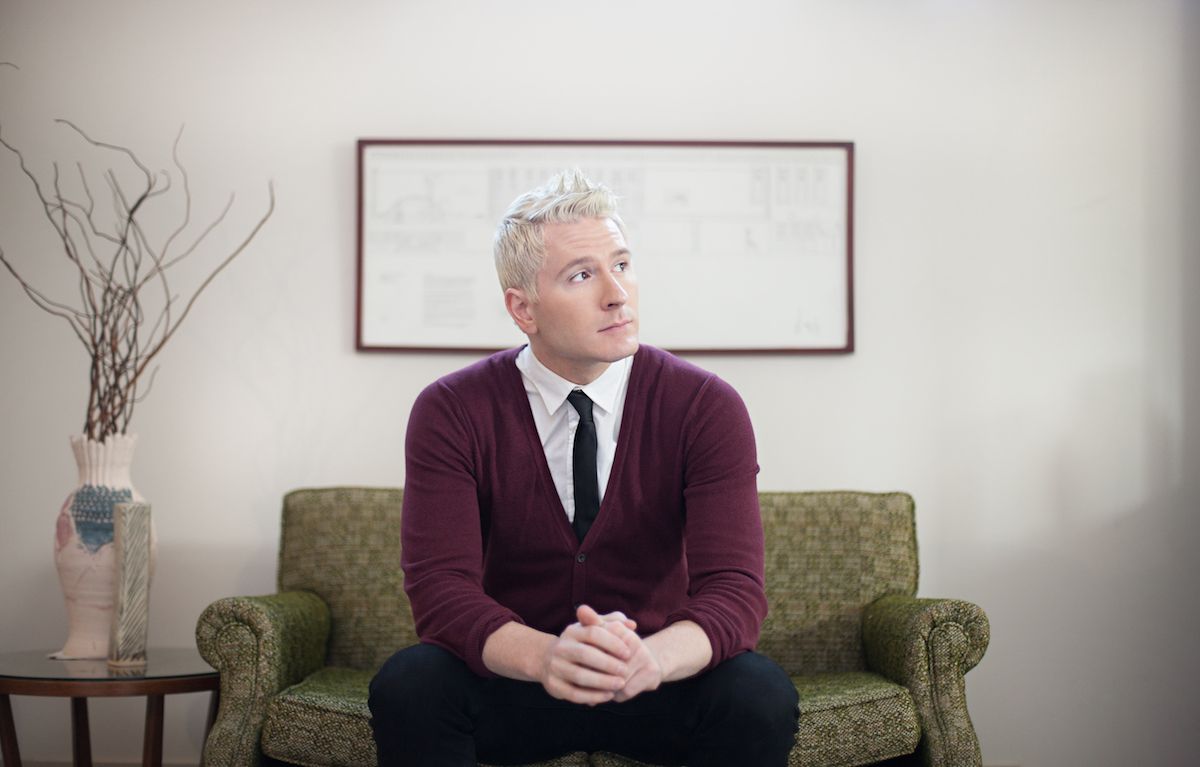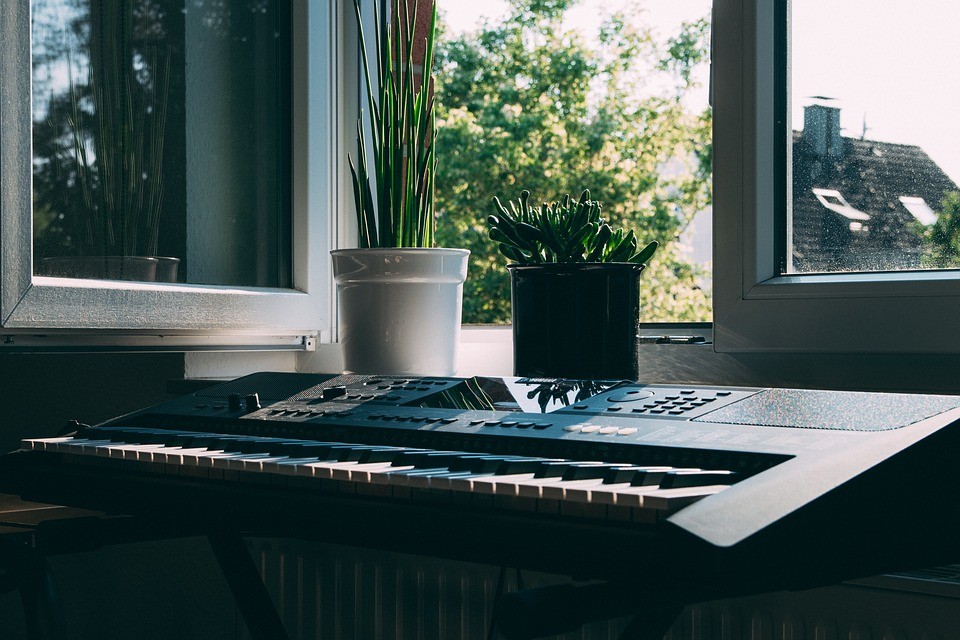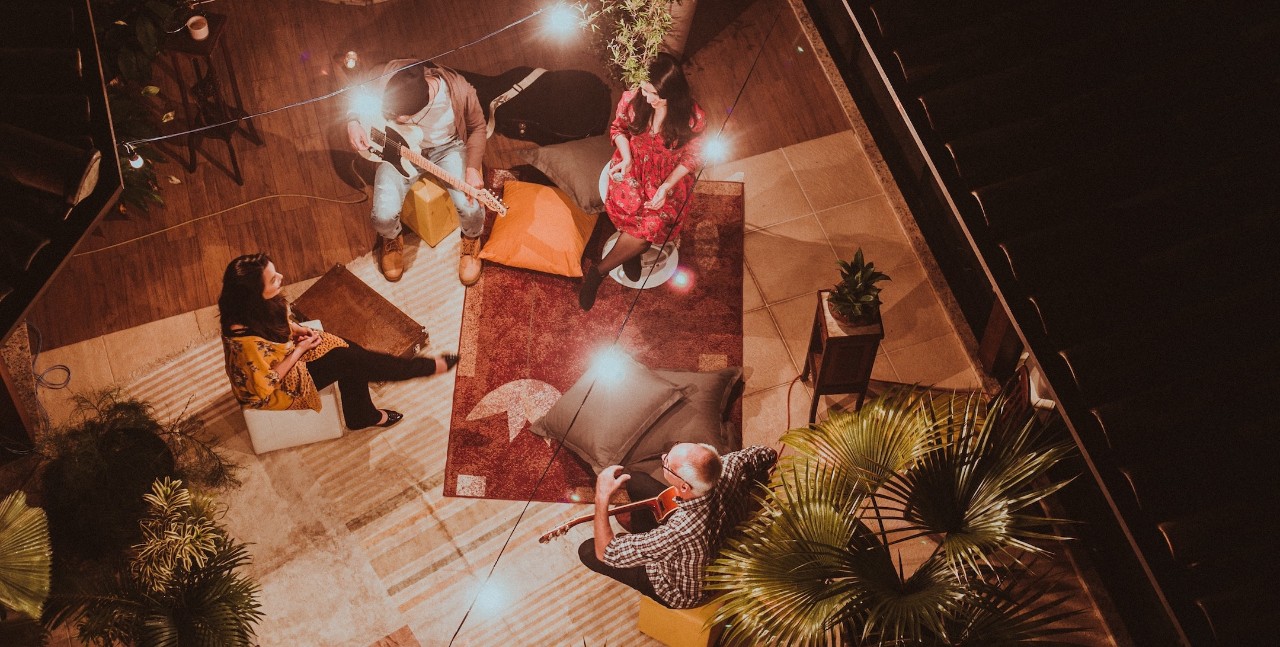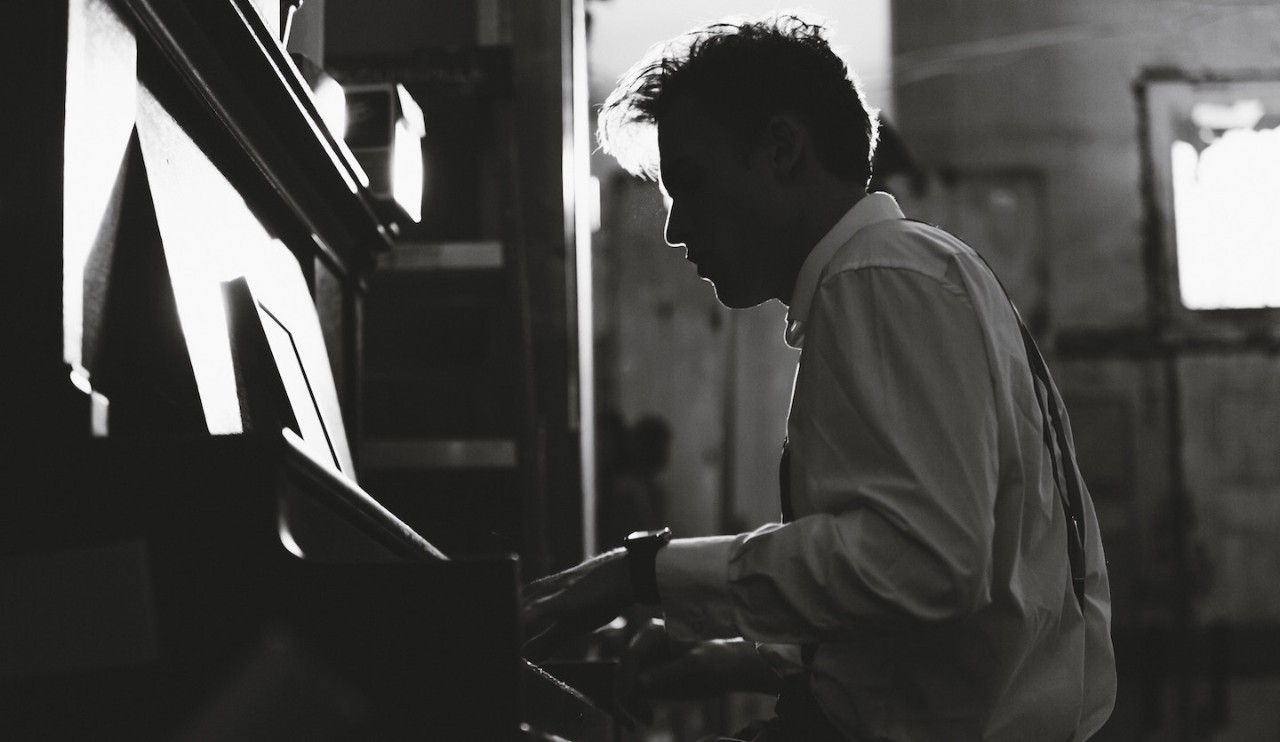
Interview: Owl City on Songwriting, Film Scoring, and Using RX
Owl City talks with iZotope about songwriting on tour, pop music, film scoring, and how he uses RX to rescue old audio.
You may know Adam Young as the guy behind Owl City, his one-man electronic music project whose 2009 song "Fireflies” has since gone 7x multi-platinum and streamed over 200 million times on YouTube. Or maybe you know him for his 2012 hit with Carly Rae Jepsen, “Good Time.” Or perhaps you’ve heard his music in Disney’s Academy Award-winning 2012 animated film, Wreck-It Ralph. However you know him, Young’s name has become synonymous with singable songs and melodies that just stick.
I caught up with Young to talk about songwriting on tour, pop music, film scoring, how he uses RX to rescue old audio, and more.
Many of your lyrics refer to pop culture from your childhood. “Unbelievable” recalls Nintendo, Lion King, Spaghetti Os, and more. How does nostalgia for childhood affect your songwriting?
It’s funny, the older I get, the more interested in childhood nostalgia I become. I grew up in the 90s, and I love reminiscing about quirky little things that were in my life back then. I had Pogs, played laser tag, read Shel Silverstein poems, ate Gushers, and had a Michael Jordan poster on my bedroom door. Things I did or stuff I liked as a kid are easy to forget as I get older, so writing music that recalls and embraces some of those fond memories is really fun. I had a great childhood, so there is lots of song inspiration just waiting to be had.
Your website’s Bio section says that you’re always creating music: “It doesn’t matter if he’s backstage before a gig or sitting in an airport terminal, the singer, songwriter, and multi-instrumentalist will typically be penning tunes on his laptop.” How do you capture ideas on tour and find the time and energy to conceive new music on the road?
It’s true, my brain never shuts off so I’m constantly writing and creating and imagining new song ideas wherever I am. When I’m traveling, I’ll sing melodies into my phone; when I’m on tour, sometimes I’ll produce a full track on a 12-hour flight to Japan. I love how audio production software today allows an artist to both conceptualize and finish a creative idea over the course of a few hours, when in the past, the same process might’ve taken days. On tour, I usually hide in the green room or on the tour bus working on my laptop because creating music is one of the ways through which I deal with life. Since life is so fast-paced and crazy on the road, I’m usually really busy.
I’ve always been driven to become better at what I do; I love the idea of trying to “beat my own score” and create a song that is bigger or better or catchier than the last. Being portable enough to work anywhere around the world is ideal for someone like me.
Some people may be surprised to learn you wrote and recorded your first records in your parents' basement, and now you record at your home studio in Owatonna, Minnesota. What would you say to aspiring musicians and producers who think they need to go to a professional studio to get a professional sound?
I indeed made my first two records in the basement of my parent’s house. At the time, I was 20-years-old and had severely limited resources, but my creative drive outweighed those limitations. That, in turn, taught me to be resourceful and inventive with the gear and software I had. I’ve since worked in some of the biggest studios around the US, and while they are all fantastic, I’ve learned over the years that my personal creative process is naturally more solitary than sociable. I like to go away, be by myself, have space to breathe and think, make a record, and then come back to reality when I’m done. That’s why I make all my music in my home studio in Minnesota—it just suits the way I’m wired and the way I like to work. I find I’m the happiest when I’m off the grid in my own world.
My advice to aspiring musicians and producers is to find out what kind of environment you thrive in. Study your creative process, what makes you tick, what atmosphere you are most creative in, and then cater to that. With audio gear being such good quality these days, even inexpensive gear—to me, that’s the most important thing to focus on: making music where you’re the happiest. Focus on the music, the arrangement, the heart and soul of the song—and I think it’s possible to make an album in a bedroom sound just as good if not better than in a pro studio.
"I made thousands of recordings years ago using an inexpensive piece of gear with noisy preamps, and RX has allowed me to rescue and restore what otherwise would’ve been unusable audio. It’s mind-blowing!"
From Carly Rae Jepsen to Aloe Blacc and Jake Owen, you’ve collaborated with a variety of artists from different genres. Who have you not collaborated with yet that you’d like to work with someday, and why?
I’ve always wanted to collaborate with Enya. Her musical sensibilities and instincts are so unique to her, you can play the first five seconds of any of her songs and know instantly it’s Enya. She just does her thing and doesn’t try to be anything other than herself. To me, that is the mark of great virtuosity—when an artist inherently sounds like no one but themselves. If he was still living today, Johnny Cash would be on my list as well. He always did his own thing. That’s the kind of artist I want to be remembered as.
Along with hits from your studio albums, you also compose music for film: “When Can I See You Again?” from Disney’s Wreck-It Ralph (2012) and “To The Sky” from Legend of the Guardians: The Owls of Ga'Hoole (2010). Tell me about making music for those two films.
They were both fantastic experiences. Something people might not know about me is that I’m really into film score music and movie soundtracks, so when the opportunities presented themselves for me to write end credit songs for Wreck-It Ralph and Legend of the Guardians, I was thrilled and couldn’t wait to get started. Writing for movies is a lot different than writing for an album but I love the challenge. You have a specific task at hand, a set of guidelines to follow. You have to ask yourself what’s the aesthetic of the movie, what mood does the music need to capture, what does the sentiment of the lyric need to be, how is the audience going to feel as they leave the theater? These are all challenges, but it’s a real joy to have all these nuances to consider and I’m excited to do more in the future. Plus, going to the theater in my hometown and hearing my music is totally surreal.
You also created a series of conceptual film scores for some of your favorite events in recorded history. You called them “lost soundtracks to films that never got made.” Tell me about why you chose those events and what your film scoring process was like for this series.
In 2016, I set aside Owl City temporarily and began composing film score music under my own name, Adam Young. Having always been inspired by legendary composers like John Williams, Thomas Newman and James Newton Howard, I had this idea of picking a handful of my favorite historical events and essentially “scoring” them with original music. I picked 11 historical events and wrote a full album of 8-10 songs or “cues” for each. For instance, I researched the 1969 Apollo 11 moon landing and wrote 10 tracks to re-imagine the events of that mission according to the way I envisioned them in my imagination. Another album was based upon Charles Lindbergh’s famous transatlantic flight, another upon Sherman’s famous March to the Sea at the end of the American Civil War, another upon the first ascent of Mount Everest in 1953, another upon Ernest Shackleton’s Endurance expedition in the Antarctic. It was a tremendous amount of work to compose, record, and mix 11 albums in one year, but I learned a great deal and the experience was incredible. I can’t wait to do more in the future.

Adam Young (Owl City) | Photo by Abbey Olmsted
On the About section of your film scores project, you write: “Along the road, I’ve experienced my share of highs and lows and I’ve learned the mainstream pop music industry can be a frustrating place for everyone. It has a way of coaching one to adopt a creative process that may or may not come naturally, depending on the individual.” What advice can you give to other songwriters who may feel their creativity is constrained by the pop music industry?
My advice is to keep your feet on solid ground and don’t be swayed or influenced negatively by the industry, which can be capricious and volatile. I went through a period of my career when I felt tossed-to-the-wolves, and the most important thing I learned is to stand for what you believe in. As an artist, always create the kind of music you want to hear. Don’t let anyone tell you what you like. Don’t let anyone tell you who to be. Have an open mind always, but be resolute. Don’t let anything change you, and you’ll be fine.
You do a perfect kickflip in your short film contest announcement video. What other skills do you have that people might not know about?
Skateboarding is something I do to cleanse my palate when I need a break from music. I like birdwatching, spending time in the woods, and I’ve recently taken up field recording. I love grabbing my portable recording kit and capturing a summer thunderstorm, or wind through the tall grass in the countryside, or a 100-year-old oak tree creaking in the forest—there is a symphony of natural sound all around us that we are really good at tuning out—I’ve recently begun to tune in to that world a little bit and I’m constantly amazed by what I hear.
Shifting gears, how do you use RX in your music? Any specific songs, scores, or software features you use that you could tell us about?
RX is an incredibly vital tool in my workflow. Its potential uses are endless and I’ve used it for almost everything you can think of: taming finger squeaks on an acoustic guitar track, removing mouth clicks on a vocal recording, pulling out traffic noise from a quiet field recording ambience, removing air conditioner hum, guitar amp buzz, unwanted whistles from a live concert recording, birds singing during an outdoor interview, the list goes on forever. I can’t say enough great things about RX, and I can’t count how many times I would’ve had to throw away a given piece of audio if I didn’t have RX to repair and correct it. I made thousands of recordings years ago using an inexpensive piece of gear with noisy preamps, and RX has allowed me to rescue and restore what otherwise would’ve been unusable audio. It’s mind-blowing!
You also use Neutron and Ozone. How do those two products fit into your workflow?
Neutron is like having another pair of ears listening to what I’m doing and offering a fresh perspective. So often, I am listening to an element of a mix and I know it needs something but I can’t figure out exactly what. I put Neutron on, and I go “that’s it!” That’s exactly what it was missing. Ozone goes on every mix I do as well. When I deliver music to record labels or management or mix clients, Ozone allows the music to live alongside everything else and it’s the final polish I couldn’t do without. All in all, my career wouldn’t be where it is today without iZotope products.
What are you working on now?
I’m working on my next Owl City album at the moment. I’m holed-up in my studio in Minnesota writing songs and recording up a storm. It’s a life I wouldn’t trade for anything.
Head to Owl City’s website to keep up with Adam Young’s latest musical projects. Want to see for yourself what RX can do for your music production? Check out RX 6.


